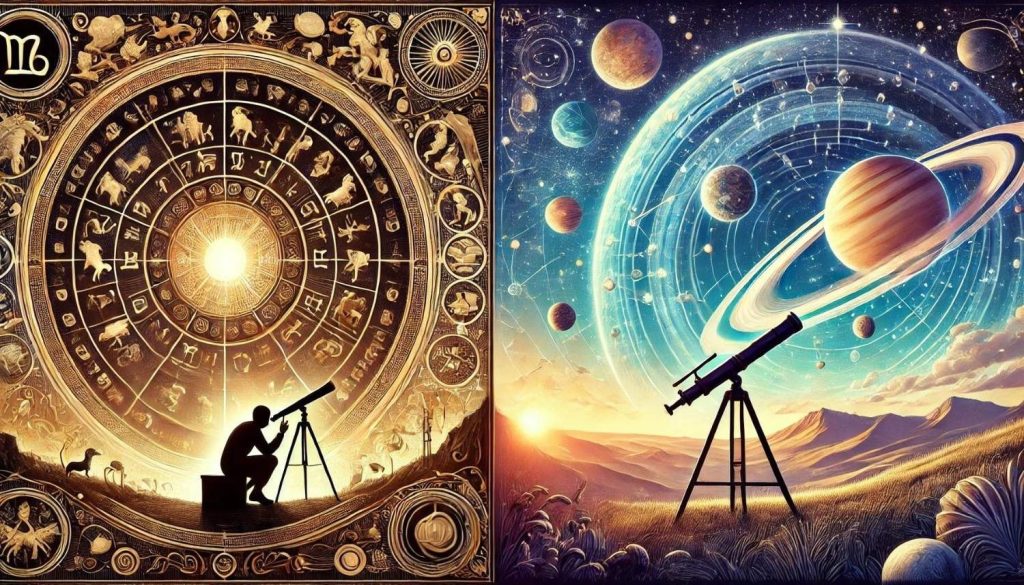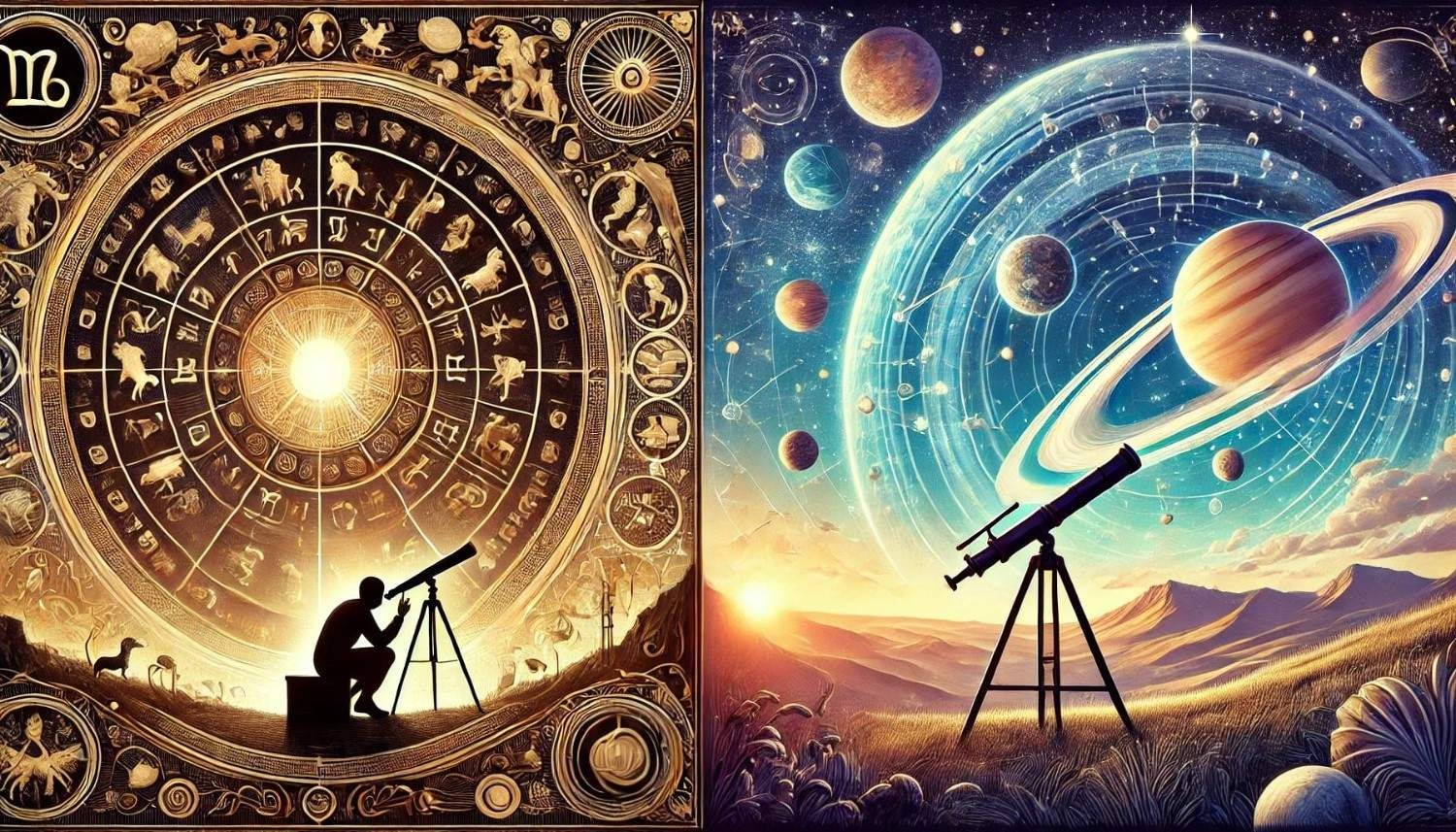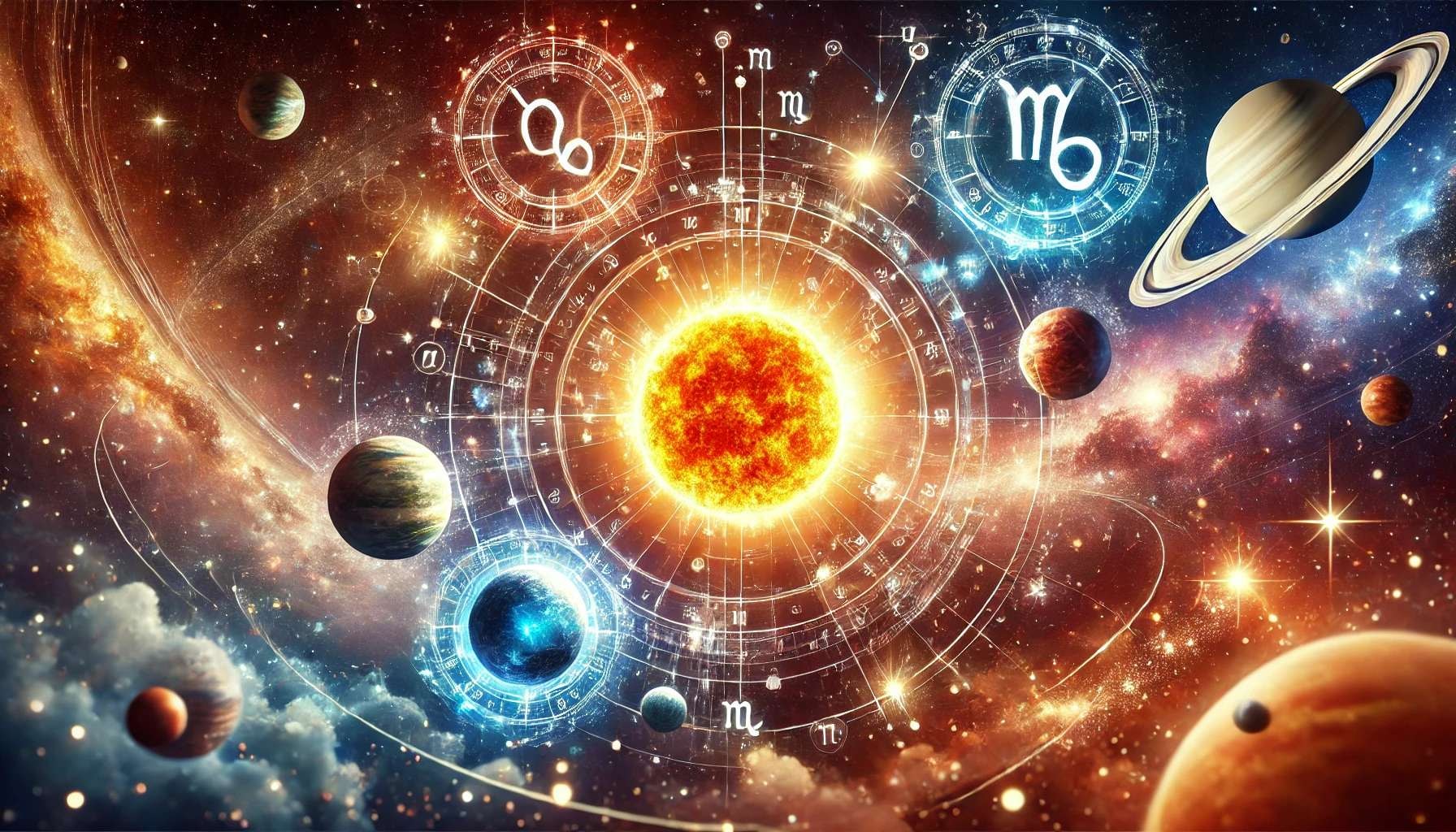Science Astrology: Is Astrology Scientific? The Truth About Its Roots
Olivia Marie Rose | January 13, 2025

- Key Takeaways
- What is Astrology?
- The Science of Astrology: Exploring the Fundamentals
- Does Science back Astrology?
- The Scientific Community’s View on Astrology and Astrological Beliefs
- Why Do People Believe in Astrology?
- Astrology vs. Astronomy: Understanding the Difference
- What is the Role of Astrology in Modern Life?
- Conclusion
- FAQs About Astrology
Many of us have turned to astrology at some point—whether to learn about our personality, understand relationships, or simply get a glimpse of what the moment and future holds.
Is astrology really based on science, or is it just a belief? Many people love it, while others think it’s just superstition.
So, what’s the truth behind astrology? Is there any scientific validity or foundation to the claims it makes, or is it all just ancient beliefs passed down through generations?
In this blog, we’ll look at the science of astrology, how it’s different from astronomy, why people believe in it, and if it’s scientifically proven. Whether you’re unsure or a fan of astrologers, you’ll get a clear idea of where astrology fits in science.
Key Takeaways
Astrology is based on the belief that the positions of celestial bodies influence human behavior and destiny.
Despite its long history and widespread popularity, astrological predictions lack scientific proof.
Scientific studies show that astrology doesn’t meet the rigorous standards required to be considered a science.
People still believe in astrology because of psychological and emotional reasons, not scientific validation.
What is Astrology?

Before diving into whether astrology is scientific, it’s important to understand what astrology actually is. Astrology is an ancient practice that studies celestial bodies- stars and planets, and other astronomical phenomena—and their supposed influence on human affairs and natural events.
Astrology dates back thousands of years, originating in Babylon, and was practiced in various forms across ancient cultures such as Egypt, Greece, and Rome. Today, Western astrology is the most well-known, with twelve zodiac signs representing different personality traits, strengths, and weaknesses, and is often used to forecast a person’s future.
At its core, astrology suggests a connection between the universe, nature, and human beings—what happens in the sky is believed to affect life on Earth. Despite its popularity, whether it can be classified as a science remains up for debate. While there’s no scientific proof, some still believe in science astrology and its influence.
Key Aspects of Astrology:
Zodiac Signs: Each person is assigned a zodiac sign based on their birth date.
Horoscopes: Daily, weekly, or monthly readings based on the positions of celestial bodies.
Astrological Houses: The twelve areas in the birth chart that represent different life aspects like relationships, career, and personal growth.
The Science of Astrology: Exploring the Fundamentals
Astrology seems to have a foundation in observable phenomena like sun and celestial bodies’ positions, though the science in astrology is often debated. But does this make it a science? Let’s explore.
Science requires empirical data, repeatability, and testability. Astrology falls short on these fronts. While astronomy studies celestial bodies scientifically, astrology does not. It lacks the testing, measurement, and predictability of other established sciences.
Astrology’s focus is more symbolic, interpreting the alignment of planets and stars as influencing a person’s life. This philosophical approach makes it difficult for astrology to qualify as science because it doesn’t adhere to the scientific method.
Does Science back Astrology?
Astrology has faced scientific scrutiny for centuries, and despite claims of science in astrology, studies fail to show consistent, reliable results. While astrology has faced scientific scrutiny, alternative theories in fields like psychology have made more progress in understanding human behavior and experience.
Numerous studies have tried to determine if astrology can accurately predict human behavior or events. So far, the results have generally been underwhelming.
A famous study by Michel Gauquelin, a French psychologist, sought to test astrology by analyzing the success of individuals in specific careers based on planetary positions at birth. The results did not provide clear, repeatable evidence that astrology had any predictive power.
Astrologers claim that astrology doesn’t need to meet scientific criteria. They see it more as an art form, relying on celestial symbolism to provide insights into personal growth rather than making precise, testable predictions.
The Challenge of Testing Astrology
Astrology struggles with one major issue: lack of repeatability. The lack of consistent, observable results makes it hard to scientifically validate astrology. This inability to provide empirical data prevents astrology from being accepted as a legitimate science.
The Scientific Community’s View on Astrology and Astrological Beliefs

Astrology, despite being widely known, is often seen as pseudoscience in the scientific world. Critics argue that astrology fails to offer testable or reliable predictions based on results, which are key to scientific study. There is no solid evidence to support the idea that planets, stars, or celestial bodies influence human behavior or personality as astrology suggests.
Lack of Evidence
One major issue with astrology is its lack of evidence. In science, theories need to be testable, repeatable, and produce consistent results. Astrology, however, doesn’t meet these requirements.
Many studies have tried to match up astrological signs and charts with people’s personalities or life events. But the results have often been unclear or contradictory, showing no real connection between the positions of celestial bodies and individual traits. This lack of consistent, reliable findings makes astrology hard to accept scientifically.
Example of Failed Studies:
Many studies that tried to connect astrological birth charts with real-life outcomes—like career success or personality traits—found little or no correlation, further questioning astrology’s reliability.
What Do Scientists Say About Astrology?
Many respected scientists and researchers have openly criticized astrology for lacking scientific support. These experts argue that astrology’s scientific claims don’t meet the standards needed for science.
Carl Sagan, a famous astrophysicist, was one of astrology’s biggest critics. He called astrology “a form of pseudoscience,” saying it doesn’t follow the scientific method. Sagan pointed out that astrology can’t be tested or proven wrong, which makes it more of a belief system than a science. He also noted that astrology often works because of vague statements that can apply to anyone, not because of actual science.
Richard Dawkins, an evolutionary biologist, called astrology “soft pseudoscience.” He said astrology relies on superstition, not real knowledge, and preys on people’s desire for personal meaning, without offering real answers about how the universe works.
Neil deGrasse Tyson, an astrophysicist, also criticized astrology. He said astrology isn’t a science because it doesn’t follow essential scientific rules like predicting outcomes, reproducibility, and empirical testing. He argued that astrology doesn’t produce measurable or repeatable results, so it can’t be classified as science, even though it remains popular among many people.
Despite the criticisms from scientists, astrology continues to be widely popular, and many people find it meaningful in their lives, even though it may not meet the criteria for being labeled a science.
Why Do People Believe in Astrology?
It’s interesting to think about why so many people continue to believe in astrology, even without scientific proof. Psychologists suggest that our belief in astrology is more about psychological and social reasons than about any solid evidence.
The Barnum Effect: The Psychology Behind Astrology
One reason astrology feels so accurate to many people is the Barnum Effect. This is the tendency for people to believe vague or general statements that seem personally relevant. For example, a horoscope might say, “You’ll face a tough decision today, but trust your instincts.” This could apply to almost anyone, making it feel true to many people.
Astrology often taps into our desire for answers, especially when we feel uncertain. People may turn to horoscopes for guidance and comfort, even if they know they’re not scientifically proven to be accurate.
Astrology’s Emotional Appeal
Another reason astrology remains popular is its emotional appeal. For many, astrology is more than just about the astrological signs and predictions—it provides meaning and comfort. The idea that the stars and planets can influence our fate can help us feel more in control of life’s challenges.
Astrology can also be a tool for self-reflection. People often look to their zodiac signs to better understand their personality, strengths, and weaknesses. It gives them a way to think about themselves and their place in the world.
Astrology provides reassurance and a sense of direction, even when there’s no scientific proof behind it. This emotional connection is a big part of why western astrology continues to have such a strong following.
Astrology vs. Astronomy: Understanding the Difference
Astrology and astronomy are often confused, but they are very different fields. Here’s a breakdown of their key differences:
Astronomy: The Science of Celestial Bodies and the Universe
Astronomy is the scientific study of the physical universe. It looks at stars, planets, galaxies, and other celestial bodies through observation, mathematics, and empirical data. Astronomers gather measurable, verifiable data to understand how the universe works. It is a natural science that follows the scientific method and seeks to answer questions about the cosmos using facts and evidence.
Astrology: A Symbolic Belief System
On the other hand, astrology is a belief system that suggests the positions and movements of celestial bodies can influence human life and behavior. Instead of using scientific methods, astrology relies on symbolism and interpretation. Astrology creates horoscopes and makes predictions by interpreting the positions of the planets, sun, and moon at the time of a person’s birth.
Unlike astronomy, astrology does not have a scientific foundation or empirical evidence. It’s based on ancient beliefs and interpretations of nature, rather than data-backed observation.
What is the Role of Astrology in Modern Life?
Even though astrology isn’t considered a science, it continues to play a significant role in modern society. In fact, it has gained more popularity in recent years, partly thanks to the rise of social media and astrology apps.
Astrology in Popular Culture
Today, astrology is a big part of modern culture. Many people read their horoscopes daily in newspapers, magazines, or through mobile apps. Celebrities frequently share their zodiac signs or mention astrology in interviews, encouraging their fans to connect with the practice too.
Social media platforms, especially Instagram, are full of astrologers and influencers who share daily predictions, compatibility readings, and birth chart analyses. This has made astrology more accessible, particularly to younger generations who may not view it scientifically but still appreciate its personal insights.
Astrology is now part of the mainstream—a tool for self-reflection, entertainment, and even community building. Whether or not people believe in astrology’s scientific claims, they are increasingly engaging with it as a cultural trend.
Conclusion
So, is astrology scientific? The short answer is no. It doesn’t meet the standards of science, as it lacks proof and reliable results.
However, astrology offers something science cannot—comfort and meaning. It helps people understand themselves and find purpose in their lives.
You can explore your personality and life path with the Birth Chart Calculator. There are also free tools like numerology and gemstone calculators to learn more about yourself.
Whether you believe in astrology or not, it remains a fascinating way to reflect and connect with the universe.
FAQs About Astrology
Is astrology a science or pseudoscience?
Astrology is considered a pseudoscience because it lacks empirical evidence and does not follow the scientific method.
Can astrological predictions predict the future?
Astrology offers general predictions, but there’s no scientific proof that it makes predictions that can accurately predict future events.
Why do people believe in astrology if it’s not scientifically proven?
People believe in astrology for emotional comfort, self-reflection, and guidance during uncertain times, influenced by psychological factors like the Barnum Effect.
What’s the difference between astrology and astronomy?
Astronomy is a scientific field studying celestial bodies, while astrology is a belief system interpreting celestial objects and events without scientific proof.
Does astrology influence human behavior?
Scientific studies have not found consistent evidence that astrology influences behavior, and researchers say belief in astrology is mostly psychological.
Why is astrology so popular despite being scientifically disputed?
Astrology is popular because many believers say it provides emotional comfort and a sense of personal insight, even without scientific validation.
Recent Posts

Discover the Best Astrologers in Canada for Insight and Guidance
Olivia Marie Rose | February 21, 2025

Transcendental Meditation: What It Is, Benefits, and How to Get Started
Olivia Marie Rose | February 20, 2025

Angel of Death in History & Religion: A Cultural Perspective
Olivia Marie Rose | February 20, 2025

A Complete Guide to the Tom Cruise Natal Chart & Horoscope
Olivia Marie Rose | February 20, 2025

Neelam Stone Types & Their Benefits – How to Choose the Best One
Olivia Marie Rose | February 20, 2025
Topics
- Angel Numbers
- Astrology and Birth Charts
- Baby Names
- Best Astrologers
- Business
- Career
- Celebrities and Famous Personalities Astrological Profile
- Children
- Chinese Astrology
- Festivals
- Finance
- Gemstones
- Kundli
- Love
- Marriage Prediction
- Nakshatra
- Numerology
- Pets
- Rudraksha
- Spirit Animals
- Spirituality and Positivity
- Symbolism
- Tarot
- Understanding Hinduism
- Vastu
- Vedic
- Western Astrology Charts
- Yoga and Meditation
- Zodiac Sign Date Calendar
- Zodiac Signs
